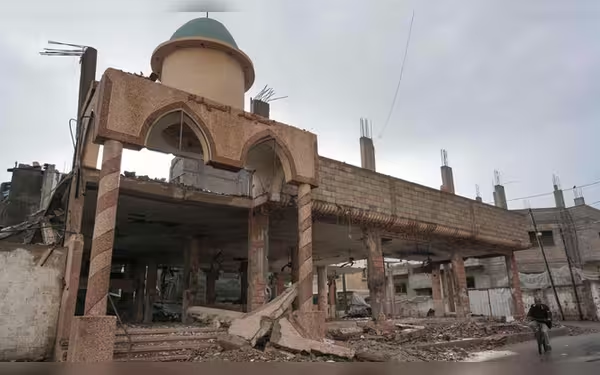Saturday, November 16, 2024 05:30 PM
Gaza Conflict Escalates: Dozens Killed in Israeli Incursion
- 26 killed in airstrikes on mosque and school shelter.
- Israeli tanks advance into northern Gaza after months.
- 42,000 Palestinians reported dead since conflict began.
 Image Credits: thefrontierpost
Image Credits: thefrontierpostThe Gaza conflict intensifies as Israeli airstrikes kill dozens, raising humanitarian concerns amid ongoing violence.
The ongoing conflict between Israel and Hamas has escalated dramatically, particularly in the Gaza Strip, where violence has surged in recent days. As the war approaches its first anniversary, the situation has become increasingly dire for the residents of Gaza, who are facing severe humanitarian crises amid relentless military actions.
On Sunday, at least 26 individuals lost their lives, and 93 others sustained injuries due to Israeli airstrikes that targeted a mosque and a school sheltering displaced people. The Hamas-run Gaza government media office reported these casualties, highlighting the tragic toll of the conflict on innocent civilians. Additionally, Palestinian health officials indicated that another 20 people had been killed since Saturday night, following the Israeli army's incursion into northern Gaza, marking the first time in months that tanks have been deployed in the area.
The Israeli military justified its actions by stating that it conducted "precise strikes on Hamas terrorists" who were allegedly using civilian facilities for military purposes. However, Hamas has vehemently denied these accusations, asserting that the mosque and school have been community fixtures for years. Imam Ahmed Fleet expressed his shock at the destruction, stating, "The mosque has been here for 20 years, and the neighborhood has displaced people." This sentiment reflects the deep emotional scars left by the conflict.
As the violence continues, the humanitarian situation in Gaza has reached alarming levels. The International Committee of the Red Cross has called for the protection of civilians, emphasizing the heartbreaking reality that families have been torn apart, with many loved ones still unaccounted for. The Gaza health ministry reports that nearly 42,000 Palestinians have been killed since the onset of the conflict, and the vast majority of the enclave's 2.3 million residents have been displaced, facing hunger and dire living conditions.
In the past 48 hours alone, Israeli airstrikes have reportedly struck 27 houses, schools, and displacement shelters across Gaza. Medics reported that three Palestinians were killed in Rafah, near the Egyptian border, where Israeli forces have been active since May. The military has issued new evacuation orders in parts of the Nuseirat camp, forcing hundreds of families to abandon their homes.
As Israeli tanks advanced into northern Gaza, residents described the night as one of the worst in recent memory, with explosions and shelling shaking the ground. Raed, a resident of Jabalia, shared his experience, stating, "The war is back," as he and his family fled to Gaza City. The armed wings of Hamas and other factions have engaged in gunbattles with Israeli forces, further complicating the already chaotic situation.
The Israeli military has stated that its operations aim to dismantle Hamas's military infrastructure and prevent the group from regrouping. They have conducted extensive airstrikes targeting military sites, including weapons depots and terrorist cells. Despite these claims, Palestinian and UN officials warn that no area in Gaza is safe, including designated humanitarian zones.
Among the casualties in northern Gaza was local journalist Hassan Hamad, whose death brings the total number of Palestinian journalists killed since the conflict began to 175. This statistic underscores the perilous conditions faced by those attempting to report on the ongoing violence.
The situation in Gaza remains critical, with civilians caught in the crossfire of a conflict that shows no signs of abating. As the international community watches, the need for a peaceful resolution becomes increasingly urgent. The heartbreaking stories of loss and displacement serve as a stark reminder of the human cost of war, urging all parties involved to prioritize the protection of innocent lives and seek a path toward lasting peace.













